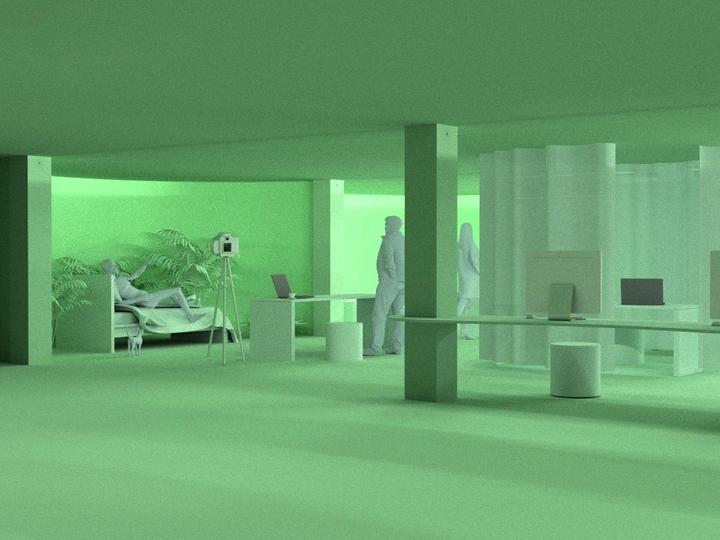Sensory Error

Sophie Schaffer
Studio z00 is a research and architecture studio founded by Sophie Schaffer and Katharina Sauermann in 2020. Working at the intersection of space-making and culture, the studio specializes in the production of experiences around speculative food futures and the curation and production of architectural design and installations. The studio experiments with different forms of media and material resources often intervening as both facilitators and designers. The work of Studio z00 has been exhibited at the architecture biennales in Tallinn, Venice, and Vienna as well as at the Milan Design Week. The studio recently taught an experimental workshop at the Vienna Architecture Summer School and guest-lectured at University Cooper Union in New York.
1/2 Sophie Schaffer works at the intersection of spatial design, art and scenography. Focused on a critical reflection on architecture and society, and the representation of the self. Ongoing research in the field of futuristic domestic perspectives emerging from digitalization. Graduated from MArch with distinction at Technical University of Vienna. Great passion for scenography, art and curating, shaped by collaborations with architecture offices in Vienna, Milan and Berlin such as Some Place Studio (DE) Breathe Earth Collective, Querkraft (AT), (Ab)normal and Parasite 2.0 (IT)
2/2 Katharina Sauermann works as an architect between New York and Vienna. In addition to her design practice, she focuses on editorial and cultural production. She is currently Content and Production Director at PIN–UP magazine and previously served as Head of International Press for the Oslo Architecture Triennale 2022 and Program Manager for the Copenhagen Architecture Festival 2018. She holds an MArch with distinction from Die Angewandte Vienna, Studio 1. Recently, she has sat on reviews at Columbia University GSAPP, Pratt Institute School of Architecture, and The Cooper Union in New York.
In a technology-driven culture of efficiency, the sensing body is being edited out. Screens teach us to look, not to sense; visuals form desire; replicas replace encounters. What appears as niche content in digital culture – ASMR, mukbang, food influencers, and delivery infrastructures – maps how bodies, buildings, and cities are reorganized. These trends not only turn indulgence into spectacle but also convert rooms and cities into broadcast infrastructure in the search for social connection. How can architecture read these as typologies and atmospheres that reveal simulated presence and outsourced intimacy?
In the economy of images, vision dominates the hierarchy of senses. Agent- and machine-driven interactions reduce access to unexpected encounters with taste, smell, or touch; such encounters are replaced by aestheticized approximations. In search of a shared literacy of presence, how can architecture reweight this imbalance? Which spatial conditions acknowledge our sensory apparatus shaped by time, air, light, acoustics, proximity, and texture, beyond the visual?
Learning from digital cultures, we aim to re-acknowledge the sensing body in space without entering a kind of simulated intimacy. We seek to recover the senses – not as a return to pre-digital purity, but as a choice for presence: accepting slowness, ambiguity, and sometimes discomfort. We want to explore how architectural tools can allocate room, time, and attention for this.
Bodies remember, and in that lies a quiet form of resistance against the flattening of experience into image, the reduction of sensation into content. We envision this project as an editorial and immersive intervention. We invite spatial explorations, readings, and other forms of research, since sensation cannot be fully quantified, captured, or predicted; it matters precisely because it cannot be tracked or optimized.